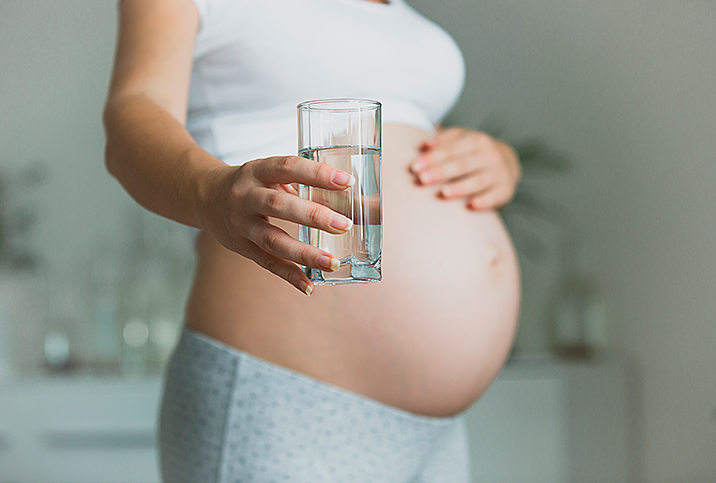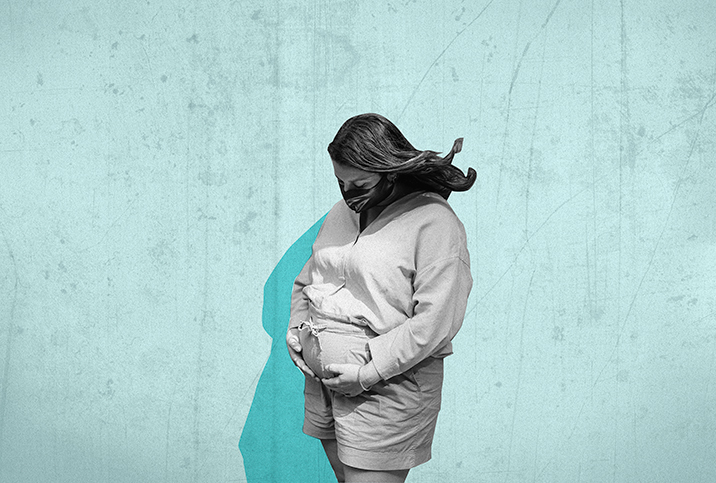Can Your Microbiome Impact Pregnancy Outcomes?

Although the human gut microbiome's effect on metabolism and immunity is well-known, a growing body of evidence suggests microbiomes, including the vaginal microbiome, could affect reproduction.
Research suggests a healthy microbiome supports a healthy pregnancy. Dysbiosis, or dysbacteriosis, when the microbiome is in distress, may even contribute to complications such as miscarriages and preterm birth.
What is the role of lactobacillus in the vaginal microbiome?
The human body is teeming with trillions of bacteria, most of which are beneficial. These microbes, collectively called the microbiota, populate spaces including the gut, mouth, skin and reproductive tract and are thought to contribute to multiple systems and processes.
The vaginal microbiome is the most densely populated portion of a larger microbiome that extends through the reproductive tract, including the cervix, uterus, fallopian tubes and ovaries, said Tiffany Stankewicz, Ph.D., a Philadelphia-based global endometrium product director at Igenomix, a medical testing laboratory specializing in infertility.
A microbiome's composition is unique to each person and changes over time. For most healthy people of reproductive age, one type of bacteria, lactobacillus, is most prevalent.
"During childhood, anaerobes and E. coli are predominate. Following puberty, estrogen increases, leading to the production and accumulation of glycogen, encouraging lactobacillus growth," Stankewicz said. "It is during a woman's reproductive years when a healthy vaginal microbiome is defined by a dominance of lactobacillus."
What should you know about maternal microbiomes?
During pregnancy, the microbiome becomes even less diverse as lactobacillus proliferates, increasing its population count by twofold, said Stankewicz and Kyler Elwell Silver, M.D., assistant professor of obstetrics and gynecology at the University of Texas Southwestern Medical Center in Dallas.
"The human microbiome is influenced by multiple factors, including hormonal changes during pregnancy," Silver added. "Ultimately, maternal physiology is modified to support the growing fetus, and this includes an ever-changing microbiome."
Jacques Ravel, Ph.D., acting director of the Institute for Genome Sciences at the University of Maryland School of Medicine in Baltimore, developed the human vaginal nonredundant gene catalog, or VIRGO, to better understand the microbiome.
The database is intended to facilitate a deeper understanding of vaginal microorganisms, including lactobacillus, and their role in health and reproduction, according to the university website.
What's the role of lactobacillus in the microbial community?
Lactobacillus produces large amounts of lactic acid and other compounds to help maintain the vagina's highly acidic environment and protect against pathogens that could affect health and reproductive function, Ravel said.
"This is a very interesting feature because it's very different than what we see at other body sites, where the microbiome is often associated with a diverse set of organisms, and often the most diverse, the better," Ravel said.
For example, in the gut, greater diversity equates to better health, he said. In the vagina, the opposite is true.
"The less diversity is associated with an optimal environment, and more diversity is associated with less optimal outcomes," he said.
Ravel noted the feature of lactobacillus dominance is unique to humans. Other mammals, including primates, have less acidic vaginas and more diverse vaginal microbiomes.
Because other mammals, including primates, do not share the same kind of bacterial composition, animal studies–a usual go-to in medical research–are not an option. Instead, scientists must rely on observational studies and in vitro models, which is one reason there has not been more research on the topic to date.
How does less lactobacillus potentially affect women?
Some people have less lactobacillus than others, instead possessing a more diverse set of anaerobes, including Gardnerella and Prevotella, Ravel said. Having less lactobacillus does not guarantee issues or a high-risk pregnancy, but it can increase a person's vulnerability.
For example, people with less lactobacillus are more likely to contract sexually transmitted infections, or STIs, such as HIV, chlamydia or gonorrhea, which can contribute to pregnancy complications and endanger fetal development and infant health.
People without insufficient lactobacillus are also more susceptible to yeast infections, which stem from an overgrowth of Candida albicans, and other vaginal infections, such as bacterial vaginosis, a result of Gardnerella overgrowth.
The presence of lactobacilli and positive pregnancy outcomes may go hand-in-hand.
How does less lactobacillus potentially affect pregnant women?
"Bacterial vaginosis [BV], an overgrowth of pathogenic bacteria in the vagina, has been linked to a two-fold increased risk of early miscarriage, a greater than five-fold increased risk of late miscarriage, and up to a two-fold increased risk of preterm labor," Stankewicz said.
Some scientists believe lower lactobacillus levels correlate with a higher risk of pregnancy complications due to the presence of bacterial pathogens in the endometrium, Stankewicz said.
"In the endometrium, that is the innermost layer of the uterus where an embryo implants and where the resulting fetus grows during pregnancy, the presence of bacterial pathogens leading to chronic endometritis has an estimated prevalence rate of upwards of 60 percent in women suffering from recurrent implantation failure (RIF) and recurrent pregnancy loss (RPL)," she said.
"In fact, until recently, it was assumed that a healthy endometrial microbiome was sterile," she continued. "However, like the vagina, a healthy endometrial microbiome mainly colonized by lactobacilli is associated with good reproductive outcomes in patients undergoing in vitro fertilization (IVF), whereas the presence of pathogenic bacteria together with a depletion of lactobacillus species is associated with impaired reproductive function."
Ravel and other scientists are now investigating how the microbiome could impact conception and implantation. Imperfect implantations are associated with an increased risk for preeclampsia or high blood pressure during pregnancy.
The condition can raise a pregnant person's likelihood of damage to the kidneys, brain, liver, or other organ and blood systems, per the National Institutes of Health. It can also increase the risk of preterm delivery and predispose newborns to problems such as epilepsy, cerebral palsy, deafness, blindness and learning disorders.
How else can lactobacilli affect a woman's body?
Ravel is also looking into how dysbiosis in the microbiome and a lack of lactobacilli could lead to problems with cervical remodeling, or the process wherein the cervix softens, ripens, dilates and repairs before, during and after childbirth.
However, he stressed more research is needed.
"There's plenty of women who don't have lactobacillus and still deliver at term," he said. "So, while it's possible, and it's likely that the microbiome plays a role in this, it's not the only contributor to the risk."
Part of the answer may lie in how bacteria function, he continued. Gardnerella vaginalis, for example, is a genetically diverse set of bacteria. So, not every iteration of this bacteria behaves the same.
"Some of them might have one or two extra genes that could be toxic, or that could induce some response in some women, but not others," he said.
"The role of the microbiome is to create an environment that tends to be more protective. It explains a lot of things for sexually transmitted infections and other infections, but it's a lot more challenging when it comes to pregnancy outcomes," he continued. "We don't yet have a full picture of the role of the microbiome in that outcome."
How might other microbiomes impact pregnancy?
Other facets of the microbiota can potentially affect pregnancy, fetal and infant health. For instance, the gut microbiome, which houses 70 percent of the 100 trillion human microbiota, plays a key role in nourishing and protecting the growing fetus, Silver said.
"There is a distinct change in flora throughout pregnancy, with a gradual increase of Proteobacteria and Actinobacteria," she said. "The changes in gut flora are associated with increases in energy storage, and with inflammatory processes that are protective to mother and fetus."
Gut dysbiosis in a pregnant person is associated with abnormal energy metabolism, including diabetes and obesity, she continued. There are also correlations between abnormal gut flora and gestational diabetes, as well as fetal macrosomia, or large fetus.
A fetus being large for gestational age can endanger the birthing person, increasing the risk of injury or hemorrhage. It is also dangerous for the baby, as larger children may be more likely to have problems such as low blood sugar, breathing difficulties and childhood obesity.
The oral microbiome changes during pregnancy too, Silver said, with a "dramatic increase" in candida (yeast). And oral health concerns, including gum disease, are closely associated with pregnancy complications.
"The dysbiosis of the oral microbiome has consistently been linked to poor pregnancy outcomes. Periodontal disease and gingivitis have a strong correlation to preterm birth. The pathophysiology is not well understood," she said.
"However, oral bacteria have been found at a higher rate in the placentas of preterm infants than in full-term infants. Interestingly, there have been case reports of oral bacteria identified in amniotic fluid after a stillbirth. Oral pathogenic bacteria have also been found in up to 50 percent of placentas from mothers with preeclampsia," Silver said.
There are a few possible reasons for the connection. For one, periodontitis is associated with a bacteria that contains prostaglandin, a labor-inducing compound that can cause premature labor.
Additionally, oral infections can raise C-reactive protein levels, which are associated with cardiovascular issues, including blood clots, strokes and preeclampsia and preterm delivery.
How can you maintain healthy microbiomes during pregnancy?
Ravel said more research is needed to confirm the best ways to maintain a healthy microbiota. However, eating a healthy, anti-inflammatory and plant-forward diet may benefit multiple microbiomes, suggested a 2021 study.
As for the vaginal microbiome specifically, there is no data to prove probiotic suppositories produce any benefit, Ravel said. But there are several other ways to maintain a healthy pH and reduce the risk of infections, as indicated by a 2017 study.
In addition to choosing a diverse maternal diet and limiting consumption of alcohol and processed sugars, experts suggest avoiding douching and using only water or a hypoallergenic soap to wash the outer vulva area. Washing inside the vagina is not necessary and can disrupt the microbiome.
Gynecologists also recommend avoiding products with added scents or flavors, such as deodorizers, cleansers, lubricants and tampons, as these can contribute to dysbiosis. Wearing cotton underwear and loose clothing can help to prevent issues like Candida overgrowth as well.


















